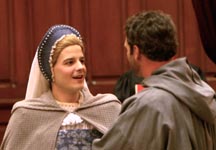- Edition: King Leir
King Leir
- Introduction
- Texts of this edition
- Contextual materials
- Facsimiles
52King Leir, Scene 7
Cast
Cordella: Julian DeZotti
Gallia: Paul Hopkins
Mumford: Alon Nashman
In contrast to the buffoonery scene 6, scene 7 was one of the most delightfully romantic scenes in the SQM performances. The focus returns to Gallia and Mumford, here disguised as pilgrims, on the shores of Britain.
Performing Mumford the Clown (Sc. 7)
53Read about performing Mumford in Scene 4
Mumford's clownish qualities are in full evidence here. The courtly formality of his opening exchange with the king is gone and he speaks in familiar, colloquial verse and prose. The scene begins with an extended gag in which Mumford fails to maintain their disguised identities by repeatedly referring to his master as "My lord" (TLN 585-589). He demands a new name to help cement their identities, rejecting the king's romantic pretentions for the plain English "Will" and "Jack."
54 The character's love of women was clear in his first scene and here he falls for Cordella as soon as he sees her. He comments comically on her commitment to a life of labor as a seamstress, giving his sexual desire expression until he is pulled out of his lustful reverie by her commitment to a "maiden's life." The exchange appears designed for performance by a principal comedian.
Read more about performing Mumford the Clown
Watch video of Scene 7 on the Performing the Queen's Men website. (The video footage is password protected. Click on "Cancel" in the pop-up window to obtain password.)
Queen's Men Dramaturgy: Medley Style (Sc. 7)
55Read about the Queen's Men medley style in Scene 5
Both of these exchanges craft the comic dialogue cleverly and were very funny in the hands of our actors, but the real charm of the scene came from its juxtaposition with Cordella's heartfelt commitment to deal with her misfortune steadfastly. Without Mumford's interjections, Cordella's struggles might have bordered on the tragic. With them we could sympathize with her plight without great fear. The scene operated in a delightful space between emotional sympathy and laughter, continually shifting us between emotional identification with the lovers and laughter at Mumford's jokes. The two responses blend into each other as we enjoy the sudden courtship while appreciating the irony of its expeditious development. Mumford's rhyme, "I like the wooing that's not long a-doing" (TLN 738), expresses a sentiment that the audience shared, and always got a big laugh. The actors playing Gallia and Cordella learned to pitch their performances in such a way to allow laughter without undermining the sincerity of their emotions. They did not allow ironic detachment to overwhelm their speedy courtship but by enjoying its suddenness themselves they allowed the audience to laugh along with their rapidly developing affections. One of the overriding principals of the SQM productions was that we would not encourage the audience to laugh at the plays themselves. This scene was an excellent example of the careful tightrope the actors walked to avoid such laughter.
56 The medley style creates a playful atmosphere within which the company explores an important social issue. The king, disguised as a poor pilgrim, falls in love with the princess brought to penury. Stripped of status by design or by misfortune, their love grows from mutual affection rather than social compatibility. The scene advocates for the importance of mutual affection in marriage - an idea that challenged the practice of arranged and politically expedient marriages common amongst the nobility. The scene develops the theme introduced at the outset of the play as Cordella freely chooses her own husband without her father's permission, a fact that challenges patriarchal authority. It was important to make the actors aware of the cultural barriers to such marriages and foster an appreciation that Cordella's willingness to love below her station was remarkable to Gallia.
While Gallia is impressed by Cordella's commitment to love regardless of wealth and social status, the audience is always aware that she is in fact in love with a king. The multiple ironies surrounding their identities situate the action in the never-land of romance where characters make choices free from the contingencies of the everyday world. Their conversation tests their resolve and commitment to their love, but we are aware throughout that the pilgrim is in fact a king and the seamstress a princess. The scene makes its point without forcing it, charming us with romantic possibilities rather than confronting its audience with the need for social change.
Read more about Queen's Men medley style
Watch video of Scene 7 on the Performing the Queen's Men website. (The video footage is password protected. Click on "Cancel" in the pop-up window to obtain password.)
Performing Cordella (Sc. 7)
57Read about performing Cordella in Scene 3
Cordella's opening speech was particularly challenging for Julian. She begins by bemoaning her fate that contrasts so starkly with the fortune of her sisters. She blames both the "fickle queen of chance" (TLN 603) and her "father" (TLN 607) but finishes by questioning her own complaint and embracing her fate as the result of God's divine providence. This final turn proved challenging. The idea of divine providence was alien to Julian but I pushed the interpretation as central to the concept of the play. In contrast to Shakespeare's play, the narrative of King Leir is driven by God's providential justice. The play's emphasis on divine providence is a sign of its adherence to contemporary protestant dogma and to the company's ideological mission. Julian saw Cordella as far more active and determined in her commitment to make her living as a seamstress; I wanted him to play it as a submission to God's will rather than as an assertion of her own or as a sign of self-determination.
58 Our negotiations with this section of the text in rehearsal and performance were informed by our own cultural attitudes and by those attitudes contained in the script. I resisted emphasis on Cordella's courage and self-reliance as it felt too contemporary. The text implies a high degree of humility and I feared Julian's choice might emphasize individual self-determination to a degree not suggested by the text. Cordella's attitude is far removed from that expressed by Scarlett O'Hara in her comparable struggle on her heath in Gone with the Wind, to choose a more contemporary example. But Julian's resistance to the passivity was also well-founded. Cordella is submitting to God's will, but she is also recognizing that God helps those who help themselves. She refuses to be the victim here and has plans for her future - an idea that was not alien to mainstream protestant theology.
59 Julian was more comfortable developing his relationship with the Gallian King than with God, and his work on this aspect of his character revealed a strength and proactive quality beyond my conception of Cordella as a conservative, patriarchal ideal of woman. This scene supports his interpretation as she first shows a steadfast commitment to a life of labor and then proves bold enough to declare her love to the poor pilgrim, saying: "Cease for thy king, seek for thyself to woo" (TLN 691). Cordella has finally chosen her husband and her commitment to romantic love enables her to choose someone she believes is far below the social status she was born to.
Read more about performing Cordella.
Watch video of Scene 7 on the Performing the Queen's Men website. (The video footage is password protected. Click on "Cancel" in the pop-up window to obtain password.)








